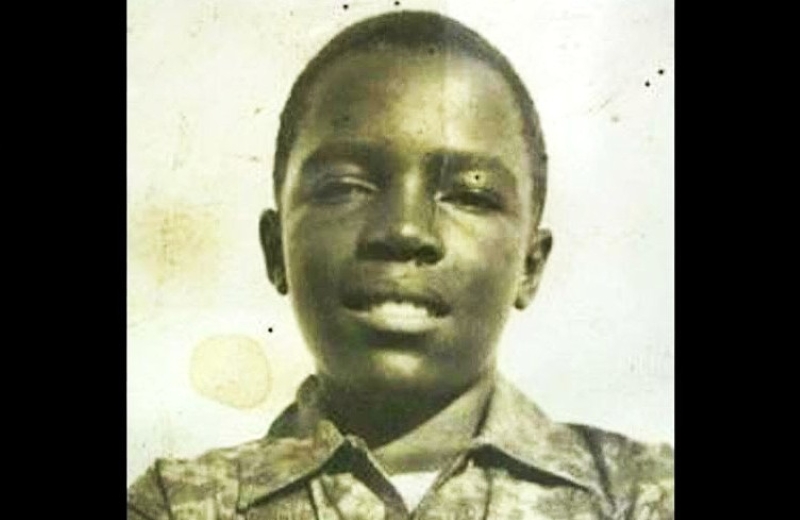Tanzania’s renowned singer, Marijani Rajabu died around this time 30 years ago.
He is among the many musicians in East Africa who passed on at very tender ages.
Marijani Shaaban Rajabu, born on March 3, 1955, in the Kariakoo District of Dar es Salaam, Tanzania, was a prominent Tanzanian musician specializing in what can be described as East African country music.
His music, like many Tanzanian tunes of the 60s, 70s and 80s were in a genre which was stuck between Rhumba, Salsa and Cavacha with a sprinkle of coastal taarab but slightly laid back and capitalizing on rich lyrics.
Marijani Rajabu’s musical journey began in 1970 when, at the age of 15, he joined the 𝗦𝗧𝗖 𝗝𝗔𝗭𝗭 under the mentorship of the famous guitarist 𝗥𝗮𝗽𝗵𝗮𝗲𝗹 𝗦𝗮𝗯𝘂𝗻𝗶.

During his time with STC Jazz, Marijani expanded his horizons by traveling to Nairobi, in the neighbouring country of Kenya and recording songs under the 𝙋𝙝𝙞𝙡𝙞𝙥𝙨 𝙍𝙚𝙘𝙤𝙧𝙙𝙨. The company would later be known as ‘Polygram!’
However, conflicts within the band led to his departure, and in 1972, he joined 𝙏𝙝𝙚 𝙏𝙧𝙞𝙥𝙥𝙚𝙧𝙨 founded and led by 𝗗𝗮𝘃𝗶𝗱 𝗠𝘂𝘀𝗮.
Under Marijani’s influence, The Trippers evolved into 𝙎𝙖𝙛𝙖𝙧𝙞 𝙏𝙧𝙞𝙥𝙥𝙚𝙧𝙨, becoming one of the prominent bands of the era, with Rajabu’s infectious voice dominating the group’s products.
At that time, Marijani also played football.
Marijani’s prowess as a songwriter, singer, and guitarist flourished with Safari Trippers, producing hit songs like 𝑹𝒐𝒔𝒂 𝑵𝒆𝒏𝒅𝒂 𝑺𝒉𝒖𝒍𝒆 and 𝑮𝒆𝒐𝒓𝒈𝒊𝒏𝒂 each selling over 10,000 copies.
Unfortunately, internal disagreements eventually led to the disbandment of Safari Trippers.
Though of course it was also suspected that, one Abel Balthazar a popular rhythm guitarist from Juwata Jazz Band, poached the entire line-up from Safari Trippers to form the new band, Dar-es-Salaam International.
In 1976, Marijani, along with some former Trippers, joined 𝘿𝙖𝙧 𝙚𝙨 𝙎𝙖𝙡𝙖𝙖𝙢 𝙄𝙣𝙩𝙚𝙧𝙣𝙖𝙩𝙞𝙤𝙣𝙖l under the ownership of 𝗠𝘇𝗲𝗲 𝗭𝗮𝗸𝗮𝗿𝗶𝗮 𝗡𝗱𝗮𝗯𝗲𝗺𝗲𝘆𝗲.
The band thrived, but clashes between Marijani and the group leader Abel Balthazar, resulted in Marijani’s expulsion.
However, when Abel Balthazar again left with a number of musicians to go and form Mlimani Park Orchestra, the management of Dar International resorted to drafting back Marijani.
Despite this setback, Marijani returned to Dar es Salaam International in 1978, bringing in new talents and adopting the Super Bomboka style. The band was managed by Ismail Issa Michuzi.
Super Bomboka days
Marijani led the music department and showcased his displeasure with his nemesis, 𝗔𝗯𝗲l Balthazar, through a satirical song, 𝑲𝒊𝒅𝒖𝒅𝒖 𝑴𝒕𝒖.
Dar International went on to produce a string of fire hits, including Zuwena, Mwanameka, Siwema, Uke Wenza, Usia wa Baba, Ponda Mali and Sikitiko as well as many evergreen hits.
Rajabu liked to compare himself with Tabuley Rochereau and many of his songs bore the musical influence of Afrisa International.
But unlike Tabuley, Marijani Rajabu hated the limelight and avoided photographs at all costs.
In 1987, Dar International disbanded due to various reasons, including equipment deterioration.
Marijani continued his musical journey with brief stints in 𝙆𝙪𝙧𝙪𝙜𝙚𝙣𝙯𝙞 Band of 𝘼𝙧𝙪𝙨𝙝𝙖 as well as 𝙈𝙬𝙚𝙣𝙜𝙚 𝙅𝙖𝙯𝙯.
Mahepe ngoma ya wajanja
In 1988, he co-led 𝙏𝙖𝙣𝙯𝙖𝙣𝙞𝙖 𝘼𝙡𝙡 𝙎𝙩𝙖𝙧𝙨, a group of over 50 musicians, creating special songs for the 10th anniversary of 𝐂𝐂𝐌 and the 20th anniversary of the Arusha Declaration.
In 1994, Marijani recorded songs with the late 𝗘𝗱𝗱𝘆 𝗦𝗵𝗲𝗴𝗴𝘆.
His final band was the 𝙈𝙖𝙝𝙚𝙥𝙚 𝙉𝙜𝙤𝙢𝙖 𝙔𝙖 𝙒𝙖𝙟𝙖𝙣𝙟𝙖, owned by the music promoter 𝗥𝗼𝗱𝗴𝗲𝗿 𝗠𝗮𝗹𝗶𝗹𝗮.
After that he retired from Music and turned to agriculture. In 1994 he is reported to have penned a total of 460 songs.
Marijani Rajabu died on 23ʳᵈ March 1995.
Marijani Rajabu’s legacy lives on through his instructive and melodious songs, honouring his Kigoma roots.
Known as ‘Bulldozer,’ or simply ‘Doza,’ he remains a cherished figure among music enthusiasts in Tanzania and beyond, leaving an indelible mark on the African music scene.
His son, Rajabu Marijani also joined the music industry but as a producer.
Marijani junior is behind the 2003 fire hits like ‘Mi Maasai,’ by Mr Ebbo and ‘Siwema,’ by Lady Jaydee (a cover version of Dar International Hits of 1983)

